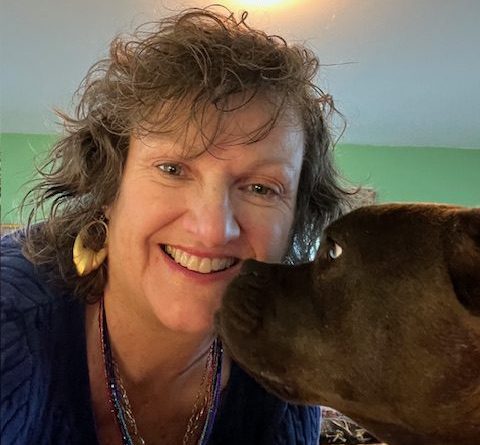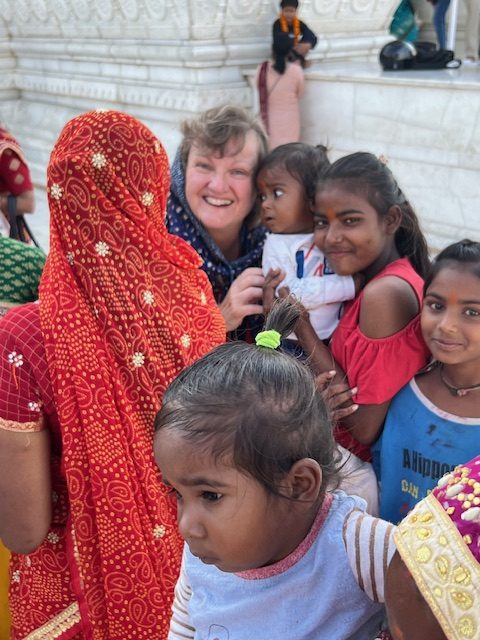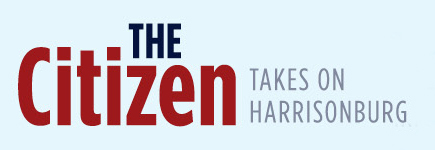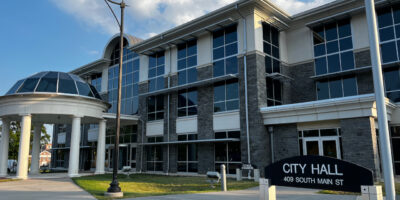
By Mike Grundmann, contributor
This is a minister who went from a troubled and dangerous workplace to one that seems a slice of heaven.
In December, Cynthia Long, 59, became lead chaplain at Sunnyside retirement home in Harrisonburg, serving 550 residents. She came from 12 years as chaplain at Western State Hospital in Staunton, whose patients could be former jail inmates or those with intellectual disabilities, sometimes mixed together, with dwindling staff to meet safety protocols.
“It’s the complete opposite on the continuum,” she says. Many patients were homeless and arrived with drug and alcohol addiction in addition to mental illness.
She has many extracurriculars: author of three books on grief, daily runner who did marathons, abstract painter, substitute Lutheran preacher and volunteer chaplain for the Waynesboro Police Department.
“It’s my DNA,” she says. “My father was the same way.”
She somehow manages to “read a lot and go out with friends a lot for dinner.”
Her career history is also packed:
B.A. in religion and business from Eastern Mennonite University. Master of Divinity and Doctor of Ministry from Lutheran seminaries. Teaching the Sociology of Death and Dying at JMU. Founding the Shenandoah Valley Grief Center in Harrisonburg. Grief support specialist at Lutheran Family Services of Virginia (Waynesboro). Pastor at Glade Creek Lutheran Church in Blue Ridge, Virginia.
She thinks and acts on the principle that everything is community, whether it’s the chaplaincy, her 32 years as a minister, her writing, her art, her running and even the therapy dogs at Sunnyside.
“They’re my comic relief,” she says, recalling the puppy who bit her nose twice. (Her dogs at home are Petra and Tabitha, both biblical names.)

Another core principle is the art of listening. A smart chaplain follows the 80-20 rule: 80% listening, 20% talking. It’s called a “ministry of presence.”
“When you’re comfortable with yourself and comfortable with pain to sit with someone who’s hurting, I’m OK with their pain, their fear.”
She grew up in New Market. A rough initiation to pain and fear came when she was 24. It was 1989 and a tornado in Alabama left her best friend missing. Twenty-four hours later, the body was found.
“I just fell apart… The silver lining was, it helped shape me on how to minister in a grief situation. … Not a day goes by that I don’t think about death. It’s part of life. I’m ready to accept it if it happens. The only caveat is, I don’t want to suffer.”
Among the do’s and don’ts of grief counseling:
“Don’t tell someone, ‘I know how you feel.’ … Don’t say, ‘God doesn’t give you more than you can handle,’ which is horrible. Or ‘Be strong.’ “
She wakes at 5:20 for her 45-minute commute from Waynesboro, listening to Christian music. She arrives at 7:30, enters the Sunnyside chapel for “a brief devotion, sing a hymn, read a psalm, maybe.” She’ll usually spend the day visiting several residents and doing the same when they’re at Rockingham Memorial Hospital. She preaches every other week, first writing a sermon and creating a PowerPoint for hymn lyrics. She attends funerals and is on call for emergencies.
The hardest thing is “when residents are in the hospital and the family falls apart, because you want to take their pain away.”
Likewise, “when people move in here, they’re grieving their old home, job, even though they’re happy to be here.” Conversation may turn to declining health. “Instead of being angry or bitter, how can you live your best life?”
(In an aside, she notes that people mistakenly believe there’s a waiting list for all three levels of care at Sunnyside. That applies only to the independent living units.)
“She has a healing touch,” says resident Eleanor Price, 73. “She comes off the pulpit and greets you.” If someone during a church service is shy, she’ll ask them to pick a hymn, and when she surveyed all residents, she found they wanted more hymns, and made the adjustment.
When Price returned from spinal surgery, “she walked me to my room, stayed there and prayed with me.” They bonded, and now “we’re always jokin’ and kiddin’ each other.”

“The people at Sunnyside are lucky to have her,” says Bob Holley, a longtime pastoral colleague in South Carolina. “She has a very gifted ability to listen.”
As a volunteer chaplain for the Waynesboro Police Department, she comforts families after a sudden death. She’s on call some nights and weekends. She also goes on three-hour ride-alongs to allow officers to share or vent.
“Officers are very colorful and blunt with their language,” she says. “They can be cynical or bitter at times. “People don’t realize how much protocol they have to follow.” They can do everything right and still be investigated. “They’re entitled to their feelings.”
“She has a good reputation around the department,” says Capt. Alyssa Zullig. “If you need her, she’ll be there.”
Also in Waynesboro, she exhibits her abstract acrylics at the Shenandoah Valley Art Center.
Her previous job, as chaplain at Western State Hospital, showed her plenty of unmet needs.
“When people have mental illness, life is completely different. Your identity, your sense of self, relationships, job, where you live. Every person coming to Western State are grieving some loss. How can you maximize quality of life?”
She served a population of about 245. Many had serious drug problems, whether using street drugs, including fentanyl, or failing to take their medications. Many came from jails and prisons.
“When there was an aggressive patient and not enough colleagues around to try and de-escalate,” staffers could be “hit in the face, stomach, thrown against the wall, choking.”
Asked if stabbing was also a danger, she replies, “Some pretty ugly things I don’t want to share.”
Funding shortages and not enough nurses entering the field helped create a vicious cycle of understaffing.
“I sometimes had to ask nurses if it’s safe to go into a room.”

In October, she and some friends took a trip to India, the birthplace of Hinduism, Buddhism, Jainism and Sikhism. It was uplifting to see that “people of varied cultures and religions can live peacefully.” She saw the contrast between “the poorest of the poor” and the wealthy. She witnessed a common death ritual in which the body is burned and the ashes poured into the Ganges River, considered a place of healing.
Looking back on her career, most rewarding “is when people tell you you made a difference in their life.” Once, “Someone brought up some sermon I’d given 10 years before. Thank you, God, for giving me this position.”
Mike Grundmann is a retired JMU journalism professor who previously worked as a reporter and editor for eight California newspapers, including the Los Angeles Times. He has produced 10 award-winning documentaries.
Thanks for reading The Citizen, which won the Virginia Press Association’s 2022 News Sweepstakes award as the top online news site in Virginia. We’re independent. We’re local. We pay our contributors, and the money you give goes directly to the reporting. No overhead. No printing costs. Just facts, stories and context. We value your support.








